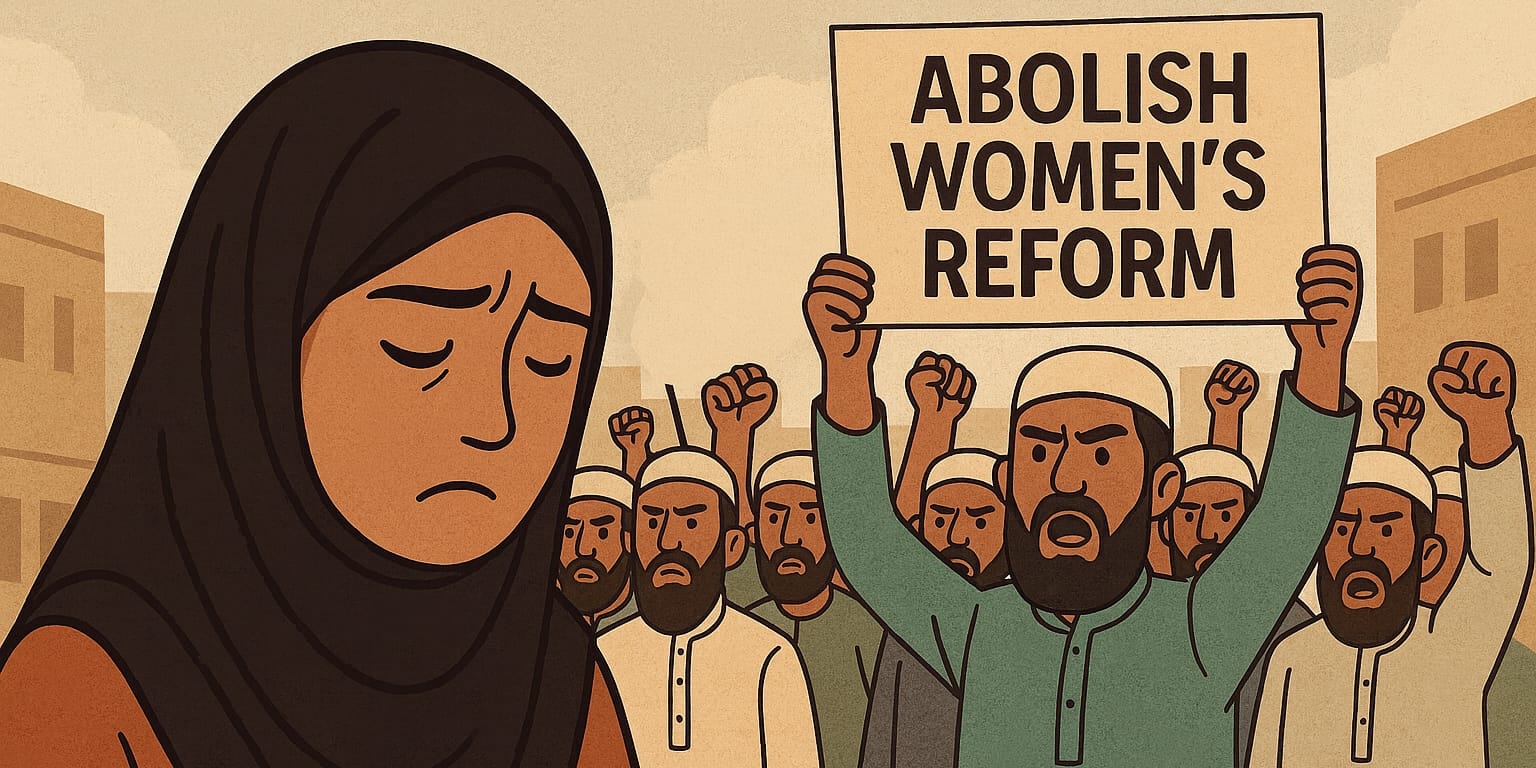Bangladeshi “religious” parties have condemned women’s rights for a variety of reasons, using religion as their shield to preach their harmful narratives. The tendency to believe unverified and not-so-credible sources, the lack of proper education on a variety of taboos, and a lack of capable religious scholars all add to and create this problem. Religion should enlighten people and broaden their perspectives, yet its misuse stampedes important issues like long overdue women’s rights and further diminishes the already low social capital among the masses.
It is no secret that women’s rights in Bangladeshi law unfairly affect women. In the light of new beginnings, a Women’s Affairs Reform Commission has submitted a report to Chief Adviser Professor Muhammad Yunus. The report, “Identifying Steps to Eliminate Discrimination Against Women,” includes 433 recommendations for legal, social, and institutional changes that have the primary aim of bringing about gender justice.
The report highlights the need for women’s economic autonomy paired with political empowerment and legal protections, which would serve as the forefront of national progress. Among the 433 recommendations, some legal recommendations are long overdue, and it is almost appalling that they were not in practice before. Among them are the recognition and subsequent criminalization of marital rape and fair ownership of assets and inheritance for women. However, Hefazat-e-Islam and Jamaat-e-Islami activists disapprove of these recommendations.
Hefazat-e-Islam and Jamaat Islam are Islamist groups that have long been criticised for misusing religion to fuel and feed a misogynistic mindset to the masses. On May 3, more than 20,000 followers of Hefazat-e-Islam rallied in Dhaka to protest against the Women’s Reform Commission’s recommendations, claiming that they were against the Islamic Sharia Law and hurt their religious sentiments.
“Say no to Western laws on our women, rise up Bangladesh,” their placards read. Interestingly enough, the protest for women did not include any women; the 20,000 present were just a sea of men who stood for abolishing women’s rights. They announced that they will hold rallies across the country on May 23 if their demands are not met. Countrywide rallies would mean gridlocked traffic, further chaos, and greater social unrest, so calling them rallies is a civil threat.
Hefazat Islam activists declared a 12-point demand that they want met, among which abolishing the women’s reform report held centre stage. The activists expressed their strong distaste for the report, calling it anti-Quranic, and reiterated the need for laws for women based on religion and culture instead of “western values”. “We want to make our demand clear – the report published in the name of women’s reform has to be thrown into the dustbin with its proponents,” said Maulana Abdul Awal, nayeb-e-ameer of Hefazat.
Another nayeb-e-ameer of Hefazat, Maulana Hazrat Anas, even went as far as to say, “The people who have prepared the report for women’s reforms are mentally sick.” This is a long-used trope by such religious extremists that further stigmatizes mental health, labelling anyone who speaks of fair rights as “mentally sick.” It is ironic that people with no verified credibility, neither as religious scholars nor as politicians, question highly credible people who are trying to establish a fairer society.
Junaid Al Habib, who is the central senior vice president and president of Hefazat’s Dhaka city unit, said, “The government needs to understand that in a nation with Islamic values, a women’s reform commission cannot be established with anti-Islamic people.” While Bangladesh has a muslim majority population, it is important to note that Bangladesh is still a secular country which is home to Hindus, Buddhists, and Christians alike.
For all intents and purposes, a secular country should have laws that treat citizens fairly, instead of laws with a religious viewpoint that only serve one group. Another one of their demands is the restoration of faith and trust in Allah in the constitution instead of pluralism. “Pluralism cannot be accepted in a country where 95% of people are Muslims. This country has to be run based on oneness or Tawhid,” said Mufti Jashim Uddin, yet another nayeb-e-ameer of Hefazat-e-Islam. It is difficult to label such sentiments as anything but extremist.
On the topic of criminalising marital rape mentioned in the report, Jamaat’s Ameer Shafiqur Rahman said, “Why should rape even arise in married life?” Further going on to say, “Their aim is to stir up conflict between husbands and wives and to flood our courts with such cases. These proposals are meant to create disorder in society. That is why I say again, from A to Z, we do not accept this commission.”
He then retracted his statements, saying, “I sincerely apologise for my unintentional choice of words” after public outrage over his previous statements and probable PR training. Backtracking on statements that were based on “religious” views shows the validity of such preaching.
Unfortunately, there have been many social media posts where men and women alike have expressed agreement with these regressive statements. This highlights the clear lack of sexual education in Bangladesh, which leads to this warped idea of sexual consent, especially harmful to women.
Sex is still taboo in Bangladesh, which creates this gap in sex education that a wide range of men misuse to preach their toxic ideologies in the name of religion. Since a lot of their target audience has low literacy, they use the guise of religion to resonate with the masses, a lot of whom do not have the appropriate resources to properly research what the correct version of their own religion’s teachings is. A striking proportion of Bangladeshis get their religious learning from unverified sources, from men who hold and preach their own sexist views as words of God.
According to a 2014 study presented by UPL and Wave Foundation, 70% of Bangladeshi women do not own any property, and in most cases, even those who do have little autonomy over their finances and their male counterparts presume control over their shares. The Women’s Affairs Reform Commission has recommended a uniform family law to ensure equal rights for women of all religions in matters of marriage, divorce, inheritance, and maintenance.
While this law safeguards women of all religions, its implementation is on an optional basis. Under this law, inheritance will be equally divided between sons and daughters. This was also a matter of great discourse for the Hefazat Islam activists, who stated how this goes against the Quran, where daughters receive half a son’s inheritance. They disregard the Women’s Reform Commission being applicable for all, and a uniform family law would also benefit Bangladeshi Hindus, whose inheritance practices often leave daughters with little to nothing. Besides, even with a uniform family law, people who hold strong religious beliefs would be free to distribute their property as they will, but the law safeguards women of all faiths.
On May 4, a Supreme Court lawyer filed a written petition with the High Court challenging the legality of some recommendations made in the Women’s Reform Commission’s report. Among these challenged recommendations are equal inheritance, gender identity, and banning polygamy, stating that they contradict religious practices. While religious freedom is a fundamental right, such a huge uproar over a report whose primary aim was to promote women’s rights really highlights a deeper issue regarding the pervasive misogyny in our society. Why does the topic of gender justice guarantee such strong denial? Why is it so hard to grasp that a secular country should have laws that protect the rights of all women?
There is still a huge disparity prevalent among men and women in Bangladesh, which is what the report essentially tried to combat. According to the Labour Force Survey 2022, only 42 percent of working-age women participate in the labour force. Bangladeshi families still prefer a son to a daughter, with some choosing to undergo sex-selective abortion, according to a recent study by Dhaka University and UNFPA. As per BBS data, 54 percent of women have experienced physical and sexual abuse at least once in their lifetime.
According to the PEW Research Center, women are universally more religious than men across all societies, cultures, and faiths. So why are men taking on the responsibility to “protect” women’s religious sentiments when their rights are what is at stake?
In a country where women’s rights are already flawed and non-existent, why do such “religious” activists protest so strongly that they threaten a nationwide standstill against the mere proposal of women’s rights? Is this really coming from a place of true devotion, or is this misusing religion to condone a patriarchal mindset that perpetuates women as secondary to men?










